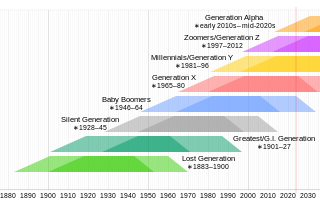Related Research Articles

Patrick Bateman is a fictional character created by novelist Bret Easton Ellis. He is the villain protagonist and unreliable narrator of Ellis's 1991 novel American Psycho and is played by Christian Bale in the 2000 film adaptation of the same name. Bateman is a wealthy and materialistic yuppie and Wall Street investment banker who, supposedly, leads a secret life as a serial killer. He has also briefly appeared in other Ellis novels and their film and theatrical adaptations.

Generation Z, colloquially known as Zoomers, is the demographic cohort succeeding Millennials and preceding Generation Alpha. Researchers and popular media use the mid-to-late 1990s as starting birth years and the early 2010s as ending birth years. Most members of Generation Z are the children of Generation X or older Millennials.
The law of attraction is the New Thought spiritual belief that positive or negative thoughts bring positive or negative experiences into a person's life. The belief is based on the idea that people and their thoughts are made from "pure energy" and that like energy can attract like energy, thereby allowing people to improve their health, wealth, or personal relationships. There is no empirical scientific evidence supporting the law of attraction, and it is widely considered to be pseudoscience or religion couched in scientific language. This belief has alternative names that have varied in popularity over time, including manifestation and lucky girl syndrome.

TikTok, whose mainland Chinese counterpart is Douyin, is a short-form video hosting service owned by Chinese internet company ByteDance. It hosts user-submitted videos, which can range in duration from three seconds to 60 minutes. It can be accessed with a smart phone app.

E-girls and e-boys, sometimes collectively known as e-kids, are a youth subculture of Gen Z that emerged in the late 2010s, notably popularized by the video-sharing application TikTok. It is an evolution of emo, scene and mall goth fashion combined with Japanese and Korean street fashion.

Dark academia is an internet aesthetic and subculture concerned with higher education, the arts, and literature, or an idealised version thereof. The aesthetic centres on traditional educational clothing, interior design, activities such as writing and poetry, ancient art, and classic literature, as well as classical Greek and Collegiate Gothic architecture. The trend emerged on social media site Tumblr in 2015, before being popularised by adolescents and young adults in the late 2010s and early 2020s, particularly during the COVID-19 pandemic.

The fashions of the 2020s represent a departure from 2010s fashion and feature a nostalgia for older aesthetics. They have been largely inspired by styles of the late 1990s to mid-2000s, 1980s, and late 1960s to early 1970s Early in the decade, several publications noted the shortened trend and nostalgia cycle in 2020s fashion. Fashion was also shaped by the COVID-19 pandemic, which had a major impact on the fashion industry, and led to shifting retail and consumer trends.
TikTok food trends are specific food recipes and food-related fads on the social media platform TikTok. This content amassed popularity in 2020 during the COVID-19 pandemic, as many people cooked and ate at home and more people turned to social media for entertainment. While some TikTok users share their diets and recipes, others expand their brand or image on TikTok through step-by-step videos of easy and popular recipes. Users often refer to food-related content as "FoodTok."
Cheugy is an American neologism coined in 2013 as a pejorative description of lifestyle trends associated with the early 2010s. This aesthetic has been described as "the opposite of trendy" or "trying too hard". The term has been used positively by some who identify with the aesthetic.
BookTok is a subcommunity on the app TikTok that focuses on books and literature. Creators make videos reviewing, discussing, and joking about the books they read. These books range in genre, but many creators tend to focus on young adult fiction, young adult fantasy, and romance. The community is cited with impacting the publishing industry and book sales. The creators in this community are also known as BookTokers.

Hyram Yarbro is an American skin care influencer known for his videos on YouTube and TikTok. His videos consist primarily of product reviews, skin care advice, and reactions to celebrity skin care routine videos. In 2021, he launched his skin care product line, Selfless by Hyram, with Sephora.
An Internet aesthetic, also simply referred to as an aesthetic or microaesthetic, is a visual art style, sometimes accompanied by a fashion style, subculture, or music genre, that usually originates from the Internet or is popularized on it. Throughout the 2010s and 2020s, online aesthetics gained increasing popularity, specifically on social media platforms such as Tumblr, Pinterest, Instagram, and TikTok, and often were used by people to express their individuality and creativity. They can also be used to create a sense of community and belonging among people who share the same interests. The term aesthetic has been described as being "totally divorced from its academic origins", and is commonly used as an adjective.
Rizz is an Internet slang word defined as "style, charm, or attractiveness; the ability to attract a romantic or sexual partner"; it originated as an abbreviation of the word charisma. The phrase was made popular outside the African American community by American YouTuber and Twitch streamer Kai Cenat in mid-2021, though it was used colloquially long before. It subsequently garnered virality on the social media application TikTok. Oxford University Press named it its word of the year for 2023.
Corecore is an Internet aesthetic and artistic movement aiming to capture post-2020 sensibilities. A product of youth culture in the 2020s, the corecore aesthetic can largely be found on TikTok, where it juxtaposes various video clips while emotional music plays.
A lazy girl job is an easy, usually white-collar, job with good pay where an employee can quiet quit. The term was coined in 2023 by Gabrielle Judge, also known by screen name "antiworkgirlboss" on Instagram, in response to hustle culture, the Great Resignation, and worker exploitation. Although the trend is centered around women, she says men can have lazy girl jobs too. Judge explained the term was a marketing gimmick in order to raise awareness about "toxic workplace expectations" and is not about celebrating laziness.
Delulu is an internet slang term used to describe the belief that one can influence one's own destiny through sheer willpower. Derived from the English-language word "delusional", the term has its origins in K-pop communities where the term delulu is used to refer to individuals who were in a parasocial relationship with celebrities and had hopes of meeting them someday. The term has subsequently been adopted by Generation Z and Generation Alpha, popularized by viral TikTok trends such as the catchphrase "delulu is the solulu", implying that self-confidence is key to achieving one's dreams, however far-fetched. Solulu and trululu are slang terms for "solution" and "truth" respectively, and they are modeled after delulu.

Looksmaxxing is a term originating from incel internet forums, and refers to maximizing one’s own physical attractiveness. "Looksmaxxing" can be traced back to mid-2014 and emerged on message boards Lookism, Sluthate, PUAHate. In the 2020s, the term left relatively obscure internet forums, and was popularised on TikTok.
Gyat is a term from African-American Vernacular English originally used in exclamation. In the 2020s, the word experienced a semantic shift and gained the additional meaning of "a person, usually a woman, with large buttocks and sometimes an hourglass figure".

Sigma male is a term in internet slang used most often to describe archetype of a male who is a "lone wolf". The name is a product of the manosphere message boards in the 2010s, the term has gained widespread prominence within internet culture, and since the early 2020s, has become an internet meme. Commonly regarded as the "rarest" type of male, a sigma male is typically denoted as an archetype of a male who is similar to the alpha male. Unlike an alpha male, sigma males are more introverted and seek to dominate themselves, in other words "self-mastery". On social media, the term is often used to describe the idolization of masculine characters from films and TV shows, or celebrities.
References
- ↑ Marples, Megan (2023-07-08). "Bed rotting: TikTok's latest trend reveals the toxic side of self-care". CNN. Retrieved 2023-08-08.
- ↑ "Experts warn about 'bed rotting' trend". Fox 8 Cleveland WJW. 2023-08-08. Retrieved 2023-08-08.
- ↑ "Actually, 'Bed Rotting' Can Be a Very Legit Form of Self-Care". SELF. 2023-08-01. Retrieved 2023-08-08.
- ↑ "What is 'bed rotting' and is it actually self-care?". The Independent. 2023-07-11. Retrieved 2023-08-08.
- ↑ Cheong, Charissa. "Step aside, hustle culture. Gen Z college students are 'bed-rotting' instead". Insider. Retrieved 2023-08-08.
- ↑ ""Bed rotting" trend can make depression worse: Chair of Psychiatry for Baltimore hospital system". CBS Baltimore. July 31, 2023.
- ↑ "Good News – We Should Be Rotting In Bed". HuffPost UK. June 9, 2023.
- ↑ Bregel, Sarah (2023-05-31). "'Bed rotting' doesn't mean Gen Z is lazy, but is it really self-care?". Fast Company.
- ↑ Lee, Bruce Y. "'Bed Rotting': What Is This New TikTok Generation Z Self-Care Trend". Forbes.
- ↑ "The Out-of-Touch Adults' Guide to Kid Culture: What is 'Bed Rotting'?". Lifehacker. June 2, 2023.